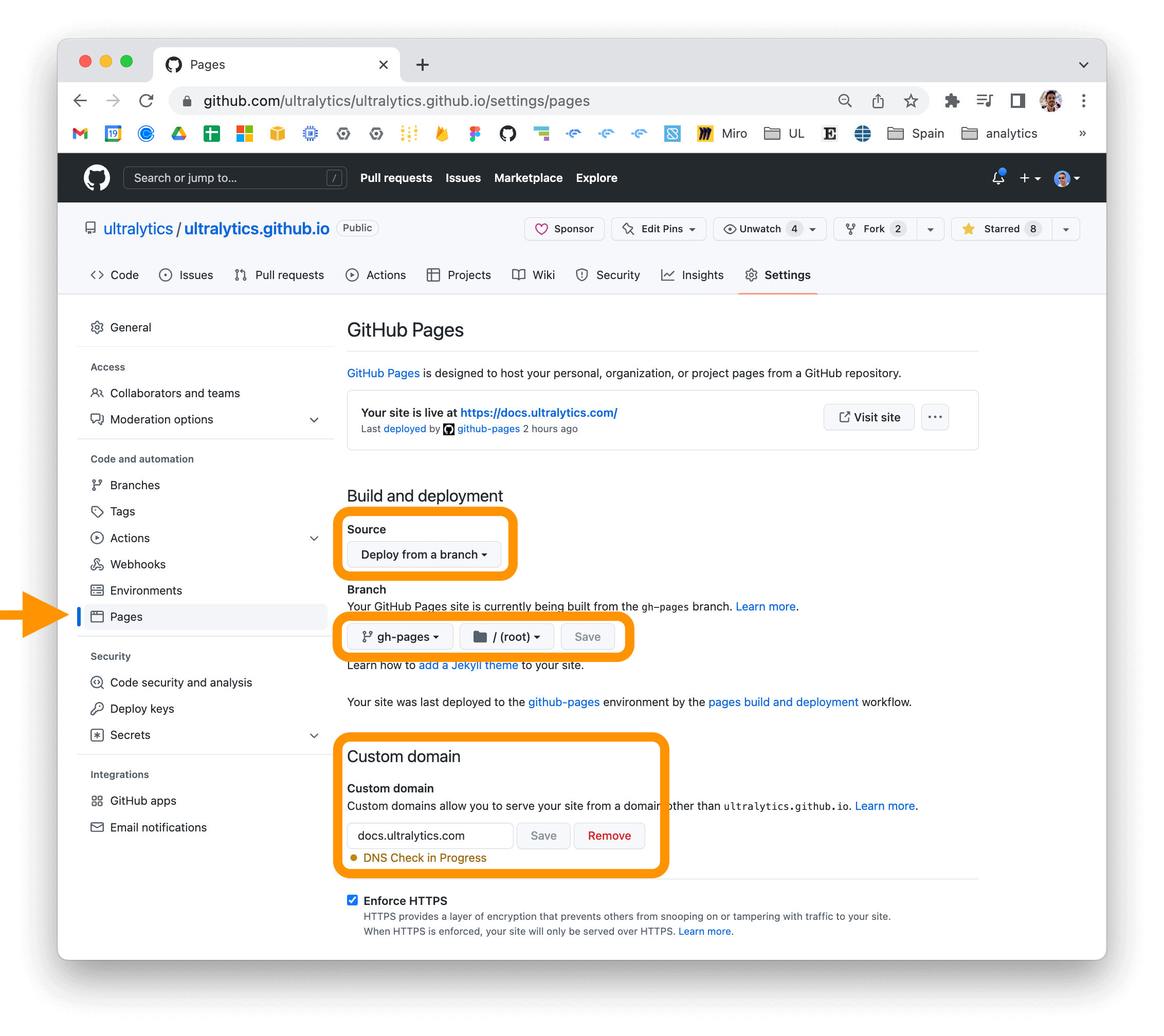 # 📚 Ultralytics Docs
[Ultralytics](https://ultralytics.com) Docs are the gateway to understanding and utilizing our cutting-edge machine learning tools. These documents are deployed to [https://docs.ultralytics.com](https://docs.ultralytics.com) for your convenience.
[](https://github.com/ultralytics/docs/actions/workflows/pages/pages-build-deployment)
[](https://github.com/ultralytics/docs/actions/workflows/links.yml)
[](https://github.com/ultralytics/docs/actions/workflows/check_domains.yml)
[](https://github.com/ultralytics/docs/actions/workflows/format.yml)
[](https://ultralytics.com/discord)
[](https://community.ultralytics.com)
## 🛠️ Installation
[](https://pypi.org/project/ultralytics/)
[](https://pepy.tech/project/ultralytics)
[](https://pypi.org/project/ultralytics/)
To install the ultralytics package in developer mode, ensure you have Git and Python 3 installed on your system. Then, follow these steps:
1. Clone the ultralytics repository to your local machine using Git:
```bash
git clone https://github.com/ultralytics/ultralytics.git
```
2. Navigate to the cloned repository's root directory:
```bash
cd ultralytics
```
3. Install the package in developer mode using pip (or pip3 for Python 3):
```bash
pip install -e '.[dev]'
```
- This command installs the ultralytics package along with all development dependencies, allowing you to modify the package code and have the changes immediately reflected in your Python environment.
## 🚀 Building and Serving Locally
The `mkdocs serve` command builds and serves a local version of your MkDocs documentation, ideal for development and testing:
```bash
mkdocs serve
```
- #### Command Breakdown:
- `mkdocs` is the main MkDocs command-line interface.
- `serve` is the subcommand to build and locally serve your documentation.
- 🧐 Note:
- Grasp changes to the docs in real-time as `mkdocs serve` supports live reloading.
- To stop the local server, press `CTRL+C`.
## 🌍 Building and Serving Multi-Language
Supporting multi-language documentation? Follow these steps:
1. Stage all new language \*.md files with Git:
```bash
git add docs/**/*.md -f
```
2. Build all languages to the `/site` folder, ensuring relevant root-level files are present:
```bash
# Clear existing /site directory
rm -rf site
# Loop through each language config file and build
mkdocs build -f docs/mkdocs.yml
for file in docs/mkdocs_*.yml; do
echo "Building MkDocs site with $file"
mkdocs build -f "$file"
done
```
3. To preview your site, initiate a simple HTTP server:
```bash
cd site
python -m http.server
# Open in your preferred browser
```
- 🖥️ Access the live site at `http://localhost:8000`.
## 📤 Deploying Your Documentation Site
Choose a hosting provider and deployment method for your MkDocs documentation:
- Configure `mkdocs.yml` with deployment settings.
- Use `mkdocs deploy` to build and deploy your site.
* ### GitHub Pages Deployment Example:
```bash
mkdocs gh-deploy
```
- Update the "Custom domain" in your repository's settings for a personalized URL.

- For detailed deployment guidance, consult the [MkDocs documentation](https://www.mkdocs.org/user-guide/deploying-your-docs/).
## 💡 Contribute
We cherish the community's input as it drives Ultralytics open-source initiatives. Dive into the [Contributing Guide](https://docs.ultralytics.com/help/contributing) and share your thoughts via our [Survey](https://ultralytics.com/survey?utm_source=github&utm_medium=social&utm_campaign=Survey). A heartfelt thank you 🙏 to each contributor!

## 📜 License
Ultralytics Docs presents two licensing options:
- **AGPL-3.0 License**: Perfect for academia and open collaboration. Details are in the [LICENSE](https://github.com/ultralytics/docs/blob/main/LICENSE) file.
- **Enterprise License**: Tailored for commercial usage, offering a seamless blend of Ultralytics technology in your products. Learn more at [Ultralytics Licensing](https://ultralytics.com/license).
## ✉️ Contact
For bug reports and feature requests, navigate to [GitHub Issues](https://github.com/ultralytics/docs/issues). Engage with peers and the Ultralytics team on [Discord](https://ultralytics.com/discord) for enriching conversations!
# 📚 Ultralytics Docs
[Ultralytics](https://ultralytics.com) Docs are the gateway to understanding and utilizing our cutting-edge machine learning tools. These documents are deployed to [https://docs.ultralytics.com](https://docs.ultralytics.com) for your convenience.
[](https://github.com/ultralytics/docs/actions/workflows/pages/pages-build-deployment)
[](https://github.com/ultralytics/docs/actions/workflows/links.yml)
[](https://github.com/ultralytics/docs/actions/workflows/check_domains.yml)
[](https://github.com/ultralytics/docs/actions/workflows/format.yml)
[](https://ultralytics.com/discord)
[](https://community.ultralytics.com)
## 🛠️ Installation
[](https://pypi.org/project/ultralytics/)
[](https://pepy.tech/project/ultralytics)
[](https://pypi.org/project/ultralytics/)
To install the ultralytics package in developer mode, ensure you have Git and Python 3 installed on your system. Then, follow these steps:
1. Clone the ultralytics repository to your local machine using Git:
```bash
git clone https://github.com/ultralytics/ultralytics.git
```
2. Navigate to the cloned repository's root directory:
```bash
cd ultralytics
```
3. Install the package in developer mode using pip (or pip3 for Python 3):
```bash
pip install -e '.[dev]'
```
- This command installs the ultralytics package along with all development dependencies, allowing you to modify the package code and have the changes immediately reflected in your Python environment.
## 🚀 Building and Serving Locally
The `mkdocs serve` command builds and serves a local version of your MkDocs documentation, ideal for development and testing:
```bash
mkdocs serve
```
- #### Command Breakdown:
- `mkdocs` is the main MkDocs command-line interface.
- `serve` is the subcommand to build and locally serve your documentation.
- 🧐 Note:
- Grasp changes to the docs in real-time as `mkdocs serve` supports live reloading.
- To stop the local server, press `CTRL+C`.
## 🌍 Building and Serving Multi-Language
Supporting multi-language documentation? Follow these steps:
1. Stage all new language \*.md files with Git:
```bash
git add docs/**/*.md -f
```
2. Build all languages to the `/site` folder, ensuring relevant root-level files are present:
```bash
# Clear existing /site directory
rm -rf site
# Loop through each language config file and build
mkdocs build -f docs/mkdocs.yml
for file in docs/mkdocs_*.yml; do
echo "Building MkDocs site with $file"
mkdocs build -f "$file"
done
```
3. To preview your site, initiate a simple HTTP server:
```bash
cd site
python -m http.server
# Open in your preferred browser
```
- 🖥️ Access the live site at `http://localhost:8000`.
## 📤 Deploying Your Documentation Site
Choose a hosting provider and deployment method for your MkDocs documentation:
- Configure `mkdocs.yml` with deployment settings.
- Use `mkdocs deploy` to build and deploy your site.
* ### GitHub Pages Deployment Example:
```bash
mkdocs gh-deploy
```
- Update the "Custom domain" in your repository's settings for a personalized URL.

- For detailed deployment guidance, consult the [MkDocs documentation](https://www.mkdocs.org/user-guide/deploying-your-docs/).
## 💡 Contribute
We cherish the community's input as it drives Ultralytics open-source initiatives. Dive into the [Contributing Guide](https://docs.ultralytics.com/help/contributing) and share your thoughts via our [Survey](https://ultralytics.com/survey?utm_source=github&utm_medium=social&utm_campaign=Survey). A heartfelt thank you 🙏 to each contributor!

## 📜 License
Ultralytics Docs presents two licensing options:
- **AGPL-3.0 License**: Perfect for academia and open collaboration. Details are in the [LICENSE](https://github.com/ultralytics/docs/blob/main/LICENSE) file.
- **Enterprise License**: Tailored for commercial usage, offering a seamless blend of Ultralytics technology in your products. Learn more at [Ultralytics Licensing](https://ultralytics.com/license).
## ✉️ Contact
For bug reports and feature requests, navigate to [GitHub Issues](https://github.com/ultralytics/docs/issues). Engage with peers and the Ultralytics team on [Discord](https://ultralytics.com/discord) for enriching conversations!












